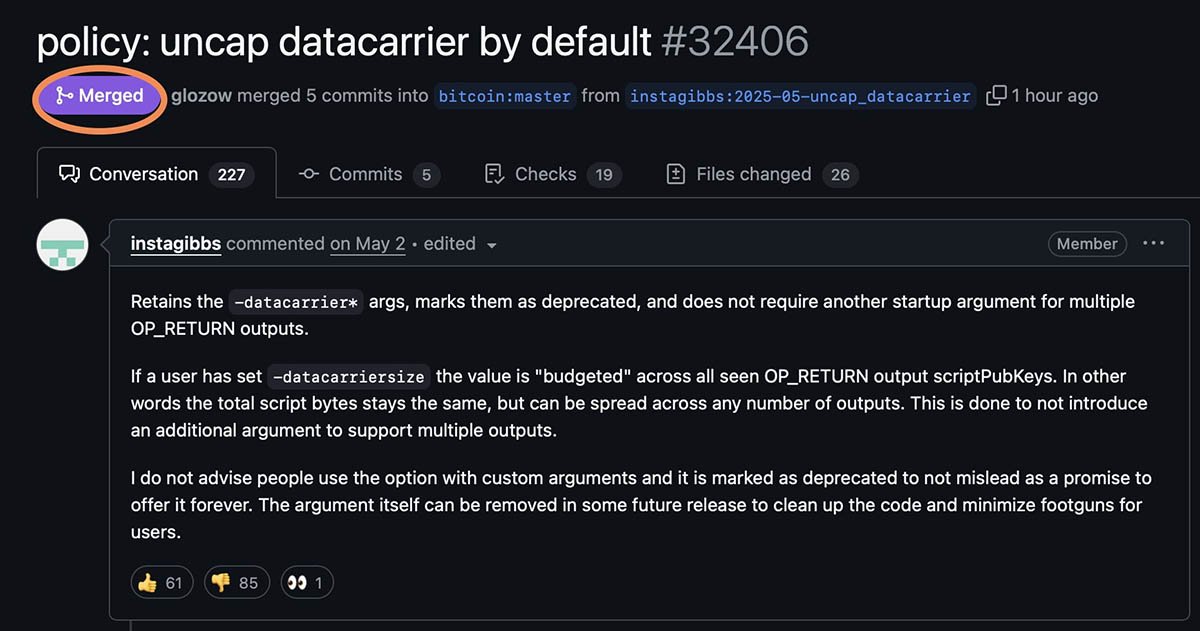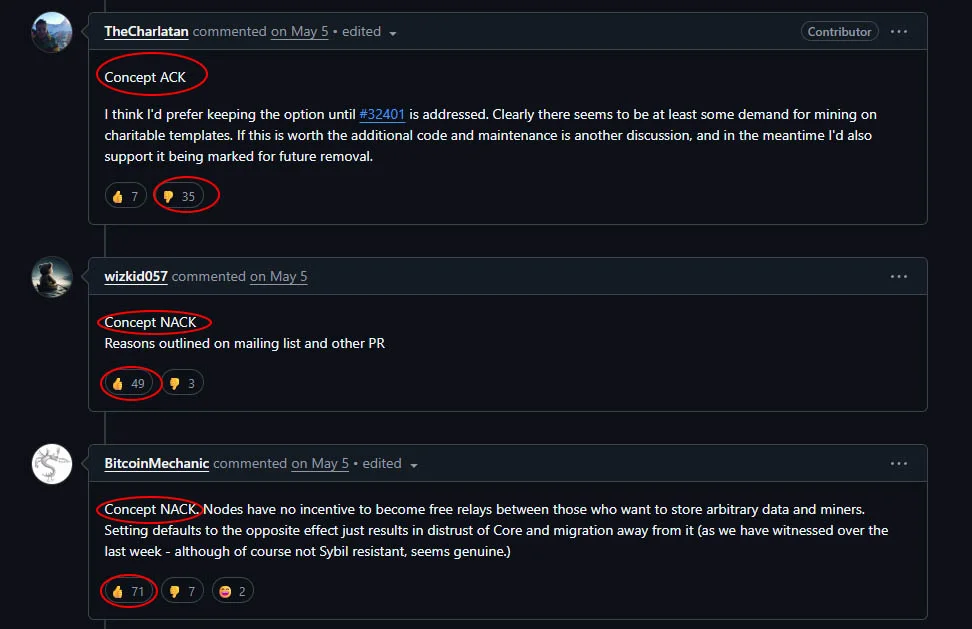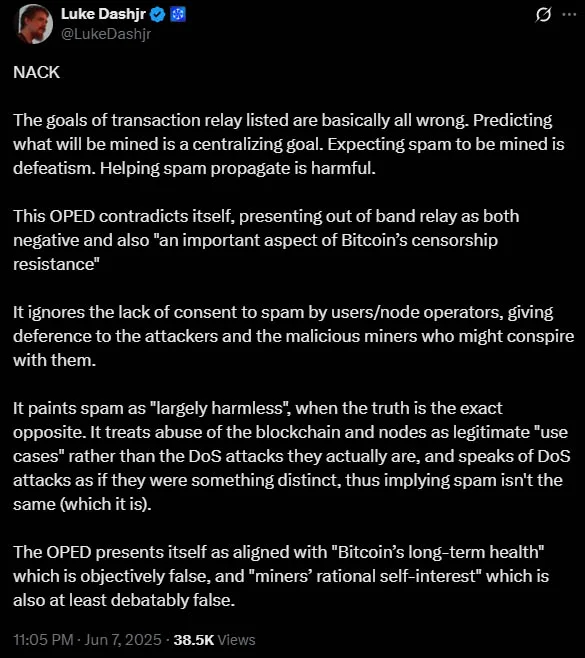Bitcoin Core Github page announced yesterday that Core Developers have merged pull request #32406, removing support for “-datacarrier” argument for Bitcoin Core software in their next release, expected to be published in October.

This is the latest development regarding the initiative brought forth by Bitcoin Core developer Peter Todd, which has caused intense debate among Bitcoiners, now known as the “spam wars”.
The disagreement is over a change to Bitcoin Core’s transaction relay policy that removes the OP_RETURN data limit, which some see as a threat to Bitcoin’s very purpose, while others see it as a necessary step to preserve decentralization and censorship resistance.
OP_RETURN is an arbitrary piece of data that can be amended to a bitcoin transaction, and used to be limited to 80 bytes. Users have found ways to go around this limit already and have uploaded larger data to the Bitcoin blockchain, including photos, audio, and even entire computer games.
Bitcoin Core allows for extra arguments when running the application, one of which is the “-datacarrier” argument, which tells the application to not accept transactions including larger OP_RETURN data into its mempool.
Now this argument is marked as “deprecated”, meaning it is not supported or developed anymore, and is expected to be completely removed in future versions.
This will make accepting Bitcoin transactions that contain non-financial data mandatory for anyone running future versions of the Core software.
Prior to the merging of the mentioned pull request on the morning of Monday June 9, a joint statement from 31 Bitcoin Core devs was released on June 6, reheating the already controversial debate in the Bitcoin community.
In the June 6 statement, Bitcoin Core devs explained how they think Bitcoin nodes should handle transactions that include non-financial data, like digital art or messages. This type of data has become more common with Ordinals and inscriptions.
Related: Discussions Heat Up Among Bitcoin Devs Over OP_RETURN Proposal
Core developers said they are not endorsing non-financial use of Bitcoin, but also won’t stop it. Their main point is that Bitcoin’s strength is in being open and censorship-resistant. They wrote:
“This is not endorsing or condoning non-financial data usage, but accepting that as a censorship-resistant system, Bitcoin can and will be used for use cases not everyone agrees on.”
They say it’s up to users and node operators to decide what kind of Bitcoin software they run. Bitcoin Core won’t block transactions that have economic demand and will be mined.
“Being free to run any software is the network’s primary safeguard against coercion,” the statement added.
The policy change goes back to a May 8th upgrade (announced by Core contributor and Engineer at Blockstream, Greg Sanders), where devs removed the long-standing 80-byte limit on OP_RETURN output size.
This limit was meant to discourage non-payment data usage, but devs say it no longer serves that purpose.
“Retiring a deterrent that no longer deters” makes sense, they argue, because people have already found ways to add large data to the blockchain.
They also point out that removing the cap may help miners and users more than it hurts. They claim the new approach helps predict which transactions will be mined, speeds up block propagation and helps miners find fee-paying transactions.
“Knowingly refusing to relay transactions that miners would include in blocks anyway forces users into alternate communication channels,” they explained, warning this could harm decentralization.
The response has been mixed.
The announcement of the merge received 64 upvotes and 93 downvotes from reviewers, showing the community is mostly against this action. Comments explaining their dissatisfaction with the merge also received the support of the majority.
Reviewers who voted ACK (acknowledgment and agreement) were downvoted, and the comments voting NACK (disagreement) received more upvotes.

Critics say it opens the door to blockchain spam, higher fees and more bloat on the blockchain with non-financial content. They say Bitcoin should stick to its original purpose as a “peer-to-peer electronic cash system”.
Samson Mow, CEO of JAN3, was one of the most vocal critics. He said the devs are removing the barriers that protect the network from spam.
“Bitcoin Core devs have been changing the network gradually to enable spam,” Mow said. “It’s disingenuous to just say ‘It is what it is now, too bad’.”
Bitcoin dev Luke Dashjr also criticized the move, saying it undermines Bitcoin’s core function. He called the devs’ goals “basically all wrong” and said expecting spam to be mined is “defeatism”.

One user said: “It’s Bit”Coin” not Bit”Bucket” or Bit”Store” or whatever general purpose data store you have in mind. It’s a peer to peer electronic cash system”.
Another user chimed in, warning it could increase costs, reduce efficiency and even hurt long-term scalability.
Their argument is simple: if nonfinancial data is allowed to be stored on the blockchain, it will increase its size over time, storing useless data, and it will hurt decentralization, as fewer individuals will be able to host the entire blockchain on their computers.
They argue allowing people to store whatever they want on the blockchain because transactions shouldn’t be censored, will lead to hurting bitcoin in the long run. Many even argue no additional information should be allowed on the blockchain at all.
But not everyone is unhappy.
Some like Jameson Lopp, co-founder of Bitcoin wallet provider Casa, praised the devs for being transparent and consistent.
“Core Devs are a group saying we can’t force anyone to run code they don’t like,” Lopp said. “Here is our thinking on relay policy and network health.”
Lopp believes a joint statement helps the public understand what the devs stand for.
Supporters also say in a truly decentralized system, devs shouldn’t be gatekeepers. Instead users and miners should be able to decide what goes on the blockchain.
With opinions so divided, the future of Bitcoin may be more contentious. Some predict a fork to create a version of Bitcoin that only deals with monetary use. Others expect new wallet and node software that lets users choose to filter out large data or allow it.
Despite the controversy, the devs are standing by their decision. “While we recognize that this view isn’t held universally,” they said. “it is our sincere belief that it is in the best interest of Bitcoin and its users.”
